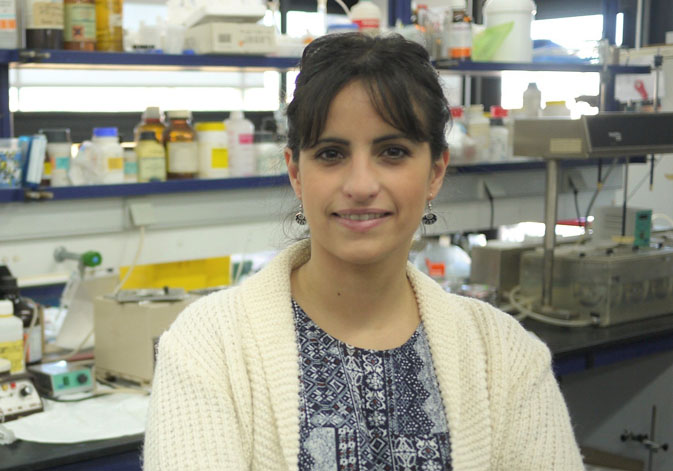The University of Valencia schedules more than one hundred science dissemination activities for secondary school students until the end of the course
- Scientific Culture and Innovation Unit
- January 31st, 2019

Conferences given by university professors in high schools and cultural centres, routes through Valencia explaining mathematics from heritage, science bars, educational workshops of Geology and Astronomy or “El Cofre de la Mar” are some of the dissemination activities that the University of Valencia organises until the end of the 2018-2019 academic year, via the Unit of Scientific Culture and Innovation, to promote scientific vocations and bring science closer to society.
So, Thursday, 31, at 12 noon at the Nuestra Señora del Socorro School in Valencia, and in the afternoon at 5 and at 7 pm, at the Educational Complex of Cheste, Lucía Hipólito, professor of Pharmacy at the University of Valencia, lectures on the effects of drug addiction on the brain.
The talk is part of the program Stimulating Scientific Vocations, which through lectures offered by researchers at the University reveals the main rare diseases, the biodiversity of the Mediterranean, parasites to food, the role of the women of the Iberian people, the neuroscientific bases of love or research in Antarctica, among others. The conferences bring science closer to secondary school students, and four more are planned during February.
According to Lucía Hipólito, an expert on the effect of alcohol on the brain and the risk factors for alcoholism, “drugs are hackers of our brain and pose as necessary for our survival. In addition, they change the function of the brain to become its most important aspect. How drugs act and transform our brain are issues that we will reveal in this talk”.
Another of the activities to be carried out during the next months are the mathematical routes, didactic and informative activities aimed at secondary school and baccalaureate students, organised in collaboration with the Mathematics Education Society of the Valencian Community Al-Klawarizmi, and which consist of itineraries scientists where the Valencian environment is used as a resource for the teaching and learning of this discipline. Only this February there are 20 scheduled. This Thursday 31 one has done with the IES Serranía de Chelva, and Wednesday 30, two more took place.
This course, until June, is scheduled to involve more than 5,000 people in these itineraries. The Torres de Serranos, the Botanical Garden, the Oceanogràfic, the Ciutat de les Arts i les Ciències, La Nau of the University or the Colón Market are some of the spaces used. Also, on the occasion of the International Day of the Girl and Women in Science, this Monday, February 11, the II Neuro Women’s Day has been organised, which aims to make visible the scientific woman and the most relevant results of the your investigation.
Science workshops
The observation of the sun with a telescope and the knowledge of the celestial bodies of the Universe; to look with the microscope paleontological elements and then appreciate them in the Geology Museum; or to identify minerals from their properties (colour, magnetism, brightness or hardness) are some of the actions that are carried out in science workshops, an action that allows secondary school students to perform different activities (experiments, demonstrations, recognitions, use of scientific instruments) in the facilities of the Universitat de València. From now to the end of the course, there are five workshops planned.
Activities in the Espai Ciència
Another of the actions to bring science to the general public are the cycles in the Espai Ciència, which the Scientific Culture Unit of the University organises in collaboration with Acció Cultural del País Valencià. Yesterday, Wednesday, the Nobel Prize Cycle 2018 concluded, aimed at putting value to the people awarded during the Nobel Prizes last year, with lectures given by university professors. On February 12 and 13, Darwin Day will be organised, consisting of a conference and a science bar, the latter consisting of a dialogue between non-experts and one specialist in a subject, in a relaxed atmosphere such as a cafeteria and where the public asks about the current situation of the area. Also, on March 27 there will be a conversation between Francis Mojica and Lluís Montoliu at the Espai Ciència.
Doctoral Theses Dissemination Conference and Science Dissemination Award
Also, among the dissemination activities of the University there is the First Doctoral Theses Dissemination Conference in 3 minutes, which has had three awards: a stay at Harvard University with a grant of € 2,000, and two awards of 500 and € 300. The winning people are Jorge Mariano Collantes, of the Systems Integrative Biology Institute; Marta Reguera, from the Faculty of Pharmacy; and Mónica Martínez López-Sáez, from the School of Law.
In addition, in November the XXIV European Prize for Scientific Dissemination «Estudi General» was resolved, convened by the City Council of Alcira and the Universitat de València in collaboration with Edicions Bromera, and endowed with € 12,000. He came to the biochemist and scientific disseminator David González Jara, with his work Las moléculas de la vida. Breviario para bioquímicos novatos.
Annual programme of activities
These activities (Mathematical Routes, Stimulating Scientific Vocations, Geology, Astronomy and Mathematics workshops, morning talks and science bars) are part of the annual activity plan of the Scientific Culture and Innovation Unit of the University of Valencia. The project has the support of the Spanish Foundation for Science and Technology (FECyT) of the Ministry of Science, Innovation and Universities.
More information on these activities:
Mathematical Routes (calendar and enrolment): http://ir.uv.es/lyBp8YN
Stimulating Scientific Vocations (list of conferences and application): http://ir.uv.es/v0lMKq8
Workshops (information and enrolment): http://ir.uv.es/Bxjn0QN
















